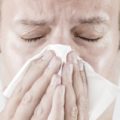
Recently on this blog, we discussed some of the most common forms of allergies and what their symptoms entailed. One of the scariest – if not most common – side effects of severe allergy symptoms is anaphylaxis.
Anaphylaxis occurs when the body's response to an allergen – usually a food or drug – is too strong, causing a tightness in the chest, difficulty breathing, facial swelling, hives, coughing or wheezing. What is especially scary about this type of reaction is that it can occur as a one time incident, come back a second day (usually up to three days later) or be a recurring reaction for an extended period.
Even with these severe reactions and potentially fatal outcomes, doctors still did not know how many people were affected by anaphylaxis on an annual basis until very recently.
Elina Jerschow, an allergist and director of the Drug Allergy Center at Montefiore Medical Center in New York City, recently conducted a study that examined death certificates from 1999-2000.
According to U.S. News Health, "During the 12-year study period, 2,458 deaths from anaphylaxis occurred in the U.S. – roughly 200 cases a year. The study showed a significant increase in the rate of these deaths, from 0.27 per million people during the first three-year period, to 0.51 per million at the study's end. The majority (59 percent) were due to medications, according to the study in the Journal of Allergy and Clinical Immunology."
With this data aggregated, the researchers then began to look at some of the demographic breakdowns of those deaths from anaphylaxis. The results showed that being older and being African-American increased the likelihood of dying from anaphylaxis as a result of a food, medicine or unspecified allergen. It also showed that those who were white, older and male tended to be more likely to die of anaphylaxis as a reaction to animal venom. Of the 2,458 deaths, the study showed that the average age was 61 for women and 69 for men.
While there is no clear reason that African-Americans have an increased likelihood, Jerschow postulates that it could have something to do with their tendency to have a higher rate of asthma, or their increased risk for heart disease and diabetes which leads them to take more medications than other demographics.
The other question that the study raises, is what drugs are causing these fatal allergic reactions? While the type of drug and its components varied across the board, Jerschow said, but in the 368 cases where anaphylaxis was due to medication, approximately 40.5 percent of those fatalities were the result of antibiotics. Of those antibiotics, penicillin was identified most commonly, followed closely by cephalosporins and sulfa drugs. For people who are not allergic, penicillin is a safe, and regularly used antibiotic for treatment of a variety of ills. But it is also known to be very dangerous for those who are allergic, and in many cases causes severe reactions.
These reactions, no matter what the allergen may be, can occur anywhere. Jerschow's study found that 59 percent of anaphylaxis patients died in a hospital. But it is completely possible for someone to suffer a reaction in public or at home, which is why knowing the best steps to take is key. According to U.S. News Health contributor, Lisa Esposito, your first priorities should be to call 911 and administer epinephrine, which is the first-line treatment for anaphylaxis.
When it comes to keeping people safe and secure from their own bodily reactions, it is important to have all the best allergy prevention products on hand. To learn more about how Allergy Be Gone can help, contact us today!









